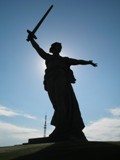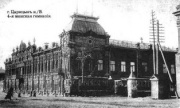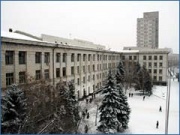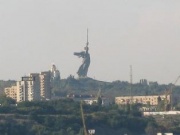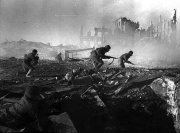Duty
Содержание |
About Volgograd City
Formerly known as Stalingrad or Tsaritsyn, Volgograd is situated on the west bank of the VolgaRiver in the Volgograd Region. The history of city begins from little fortress Tsaritsyn, that was founded in 1589. The fortress was established to help defend the southern border of tsarist Russia but it soon became a trading settlement. Though Volgograd's history was somewhat turbulent, it soon became a great city. Under the rule of Stalin it became very industrialized and it eventually became the site of the costliest battle in the history of mankind - the Battle of Stalingrad. Unfortunately much of the city was destroyed in this battle, but it was quickly reconstructed. Many of the attractions to be seen in Volgograd are in memory of the lives lost and the bravery of those people who repelled the invading German forces and possibly changed the history of the world. Most visitors spend their time seeing the historical monuments, most of which are dedicated to those who fell in the Great Patriotic War (World War II). For example there is a memorial complex that was built to commemorate the battle. It boasts a huge statue of Mother Russia that stands on Mamayev Kurgan, a hill on which some of the most brutal fighting took take place during the war. There are also other statues, some of which commemorate the grieving who survived and others that commemorate the dying. There is also a walkway that leads to the Pantheon in which 7,200 randomly picked names have been inscribed - a mere fraction of those who perished in the war. Nowadays Volgograd is a big city with great history, not less great present and, we are sure that very happy future!
About university
Volgograd State Technical University is one of the largest universities in the Volga region, an institution of higher education with versatile activities, preparing highly-qualified specialists in compliance with the multistage system of education - Bachelors of Science, Certified Specialists and Masters of Science. The university's scientific schools are well known in both our country and abroad. International cooperation with foreign educational institutions is being carried forward.
History
Volgograd State Technical University was founded and raised to its present rank as a result of direct and continuous development of Stalingrad tractor-building and mechanical institute. The institute was founded in 1930, only a month prior to starting-up the "firstling" of home tractor industry - the Stalingrad Tractor Plant, for which training of specialists with higher technical education was originally intended.
During the first 10 years of its existence the institute achieved significant success in organization of academic activities and training of highly qualified specialists. In that period about 1300 engineers graduated from it to work in machine, automotive and defence industries, 386 graduates of the institute took up key positions. In the late 30-ies training of specialists without discontinuing work became a meaningful part of the carricula. It was carried out at the evening department formed in July 1931. It prepared specialists with higher education in the evening groups and qualified workers at the factory technical courses. Employees of various enterprises and institutions could be enrolled at the evening department. And only the employees of the Stalingrad Tractor Plant and the Plant "Barrikady" were eligible for attending the factory technical courses. The courses were financed by these plants. Till 1961 the institute had only 2 faculties - foundry and machine-building. Creation of new chairs, introduction of new specialties and increase in students enrolment required reorganization of the faculties and other divisions. In 1962 the foundry faculty was transformed into the faculty of thermal metal treatment. In 1963 a new faculty of chemical engineering was formed, and the machine-building faculty was divided into automotive-tractor and machine-building. In the 60-ies broad introduction of computers for engineering and economic needs, as well for production management, set up a task to create a computer center at the institute for research and teaching purposes. Such center appeared in 1968 at the chair of electrical engineering and industrial electronics. By the beginning of the 80-ies Volgograd polytechnical institute had already become the largest versatile high school in the Volga region, a scientific school of authority that prepared engineers for machine-building, chemical and petroleum industries, autotransport management. The academic staff of the institute carried out a lot of research important for national science and economy. In 1980 the institute celebrated its 50th anniversary and was │warded Order of the Red Banner of Labour. Since early 90-ies the system of higher education in Russia underwent reforming in order to diversify the existing system, to make it more adaptable to radical changes in economy and social life in Russia, as well as to integrate it into international system of education. Professor Ivan A. Novakov, who was elected the Rector in 1989, started reforms at the institute together with new vice-rectors for academic affairs professors Vladislav A. Gudkov (till 1993) and Yury V. Popov, vice-rectors for research professors Mikhail B. Diperstein (till 1996) and Vladimir I. Lysak, vice-rectors for part-time education professors Yury A. Bondarev (till 1999) and Alexander M. Dvoryankin. The level reached by the institute in scientific and academic activities allowed the State Committee of the Russian Federation on higher education to elevate Volgograd polytechnical institute into Volgograd State Technical University (VSTU). In 1991 a rating system was introduced for evaluation of academic staff work, which added to improvement of the university's activities as a whole and stimulated the activities of prior importance.
Faculties
Auto-tractor Automobile transport Mechanical engineering Structural materials technology Food engineering Electronics and computer science Economics and management Chemical engineering Kirovsky evening faculty Krasnoarmeysky mechanical and metallurgical faculty Engineers’ training faculty Faculty for pre-university training Faculty for foreign students’ training Faculty for postgraduate studies
